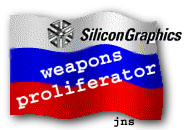
Badpuppy Gay Today |
Wednesday, 26 February, 1997 |

|
Silicon Graphics, Inc. has announced its regrets about particular new profits it has made, claiming "some serious judgmental errors" for a January shipment of two advanced super-computer systems to a nuclear weaponry design laboratory in Russia. The computers, relatively small, mimic nuclear explosions. A U.S. attorney in San Jose, California has been assigned to investigate what is generally regarded as--at least-- an improper sale.
"Ethel and Julius Rosenberg were executed in the 1950's, supposedly for giving away military secrets to the Soviets," laments Richard Presserman, an arms-proliferation critic, "but things have drastically changed in the 1990's as cheerful sales of advanced military equipment take place in the sacred name of business and about which only a few raise scornful eyebrows."
The Clinton administration had already refused both I.B.M. and Hewlett-Packard requests to ship similar equipment to the Russians. Last year, Silicon Graphics, Inc., located in Mountain View, California, acquired Cray Research, Inc., America's number one supercomputer maker. Its January sale, however, consisted of computers designed by Silicon Graphics prior to its purchase of Cray Research, Inc. The computers in question went to Chelyabinsk-70, where Russian nuclear warheads were designed during Cold War and after.
There has been a gradual loosening of U.S. regulations on technology sales to Russia, but the Silicon Graphics "bargain" appears to have been a blatant violation of America's principal guidelines, a breach belatedly admitted by Edward R. McCracken, chairman and chief executive of the company. "It is possible we were 'duped'," McCracken claims. Russian buyers insist they have purchased the advanced nuclear technology for peaceful purposes, to be used only in "environmental science" studies.
Chairman McCracken also admits to "naivety" in that Silicon Graphics, Inc. seemed not to know as much about its Russian purchasers as an otherwise secretive circumstance might demand. Investigators are now putting focus on who, precisely, was responsible for the sale, a Russian government "systems integrator," Catalyst Silicon Solutions or, perhaps, the American Moscow office of Silicon Graphics, Inc. itself, which employs Russian nationals.
Russia, like the United States, sells arms--advanced and otherwise-- to other nations. It is high on the list of what U.S. government officials call "weapons proliferators." Any sale by Americans to the listed "proliferating" nations requires U.S. licenses, even for soft-drink machines, according to federal officials.
The Silicon Graphics sale was discovered by the U.S. Department of Commerce after it was cursorily announced during a speech by the Russian ministry of atomic energy.